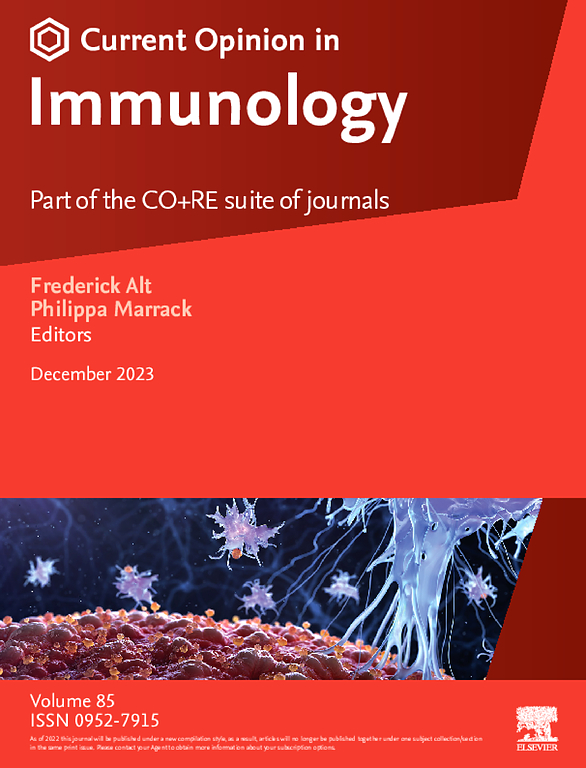我们能治愈类风湿关节炎吗?
IF 5.8
2区 医学
Q1 IMMUNOLOGY
引用次数: 0
摘要
尽管在早期干预和精确靶向治疗方面取得了重大进展,但类风湿关节炎(RA)仍然是一种慢性进行性自身免疫性疾病。虽然从治疗到靶点的模式和改善疾病的抗风湿药物改善了临床结果,但持续无药物缓解(SDFR)甚至治愈仍然难以捉摸,这强调了解决潜在免疫致病机制的创新策略的必要性。延长SDFR意味着治愈或根除疾病,但治愈的定义没有共识,因为在RA中很少考虑到它。致病性免疫回路恢复力、间质过度激活、持续结构异常和遗传易感性构成了治疗的多因素障碍。新兴疗法——包括新型生物制剂、细胞干预和基因编辑——旨在重编程致病性免疫反应,而不是抑制症状,可能具有SDFR和可能治愈的潜力。尽管临床前和早期临床数据表明有可能改变疾病轨迹,但在RA中尚未最终证明或统一实现RA免疫系统恢复正常的持久复位。“机会之窗”范式假定早期免疫调节干预可能改变疾病轨迹。然而,利用这一时间窗口的最佳治疗方法仍存在争议,特别是关于个性化生物标志物和机制靶点的整合。这篇综述总结了类风湿性关节炎治疗的进展,评估了新兴的治疗方式是否可以将临床模式从症状管理转向诱导持久的免疫正常化和治愈。虽然彻底治愈仍在遥远的地平线上,但精准医学、下一代免疫疗法和转化研究的快速融合强调了向治疗策略的范式转变。本文章由计算机程序翻译,如有差异,请以英文原文为准。
Can we cure rheumatoid arthritis?
Rheumatoid arthritis (RA) persists as a chronically progressive autoimmune disorder, notwithstanding significant advancements in early intervention and precision-targeted therapeutics. While treat-to-target paradigms and disease-modifying antirheumatic drugs ameliorate clinical outcomes, sustained drug-free remission (SDFR) or even cure remains elusive, underscoring the need for innovative strategies addressing underlying immunopathogenic mechanisms. Prolonged SDFR implies cure or eradication of disease, but there is no consensus definition of cure because it has rarely been contemplated in RA. Pathogenic immune circuit resilience, stromal hyperactivation, persistent structural abnormalities, and genetic susceptibilities constitute multifactorial barriers to a cure. Emerging therapies — including novel biologics, cellular interventions, and gene editing — aim to reprogram pathogenic immune responses rather than suppress symptoms and may have the potential for both SDFR and possibly cure. Whereas preclinical and early clinical data suggest the potential to modify disease trajectories, durable resetting of the RA immune system toward normal has not yet been conclusively demonstrated or uniformly achieved in RA. The ‘window of opportunity’ paradigm postulates that early-stage immunomodulatory interventions may alter the disease trajectory. However, the optimal therapeutic approaches for capitalizing on this temporal window remain debated, particularly regarding the integration of personalized biomarkers and mechanistic targets.
This review summarizes advancements in RA therapeutics, evaluating whether emerging modalities can pivot the clinical paradigm from symptomatic management to the induction of persistent immunological normalization and cure. Although definitive cure remains on the far horizon, the rapid convergence of precision medicine, next-generation immunotherapy, and translational research underscores a paradigm shift toward curative strategies.
求助全文
通过发布文献求助,成功后即可免费获取论文全文。
去求助
来源期刊
CiteScore
13.30
自引率
1.40%
发文量
94
审稿时长
67 days
期刊介绍:
Current Opinion in Immunology aims to stimulate scientifically grounded, interdisciplinary, multi-scale debate and exchange of ideas. It contains polished, concise and timely reviews and opinions, with particular emphasis on those articles published in the past two years. In addition to describing recent trends, the authors are encouraged to give their subjective opinion of the topics discussed.
In Current Opinion in Immunology we help the reader by providing in a systematic manner: 1. The views of experts on current advances in their field in a clear and readable form. 2. Evaluations of the most interesting papers, annotated by experts, from the great wealth of original publications.
Current Opinion in Immunology will serve as an invaluable source of information for researchers, lecturers, teachers, professionals, policy makers and students.
Current Opinion in Immunology builds on Elsevier''s reputation for excellence in scientific publishing and long-standing commitment to communicating reproducible biomedical research targeted at improving human health. It is a companion to the new Gold Open Access journal Current Research in Immunology and is part of the Current Opinion and Research(CO+RE) suite of journals. All CO+RE journals leverage the Current Opinion legacy-of editorial excellence, high-impact, and global reach-to ensure they are a widely read resource that is integral to scientists'' workflow.

 求助内容:
求助内容: 应助结果提醒方式:
应助结果提醒方式:


